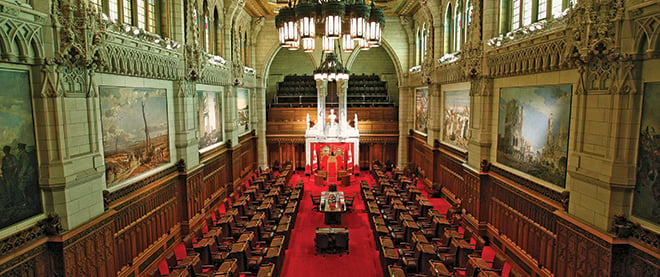Another existential week for the Senate
An increasingly sparse Senate knowingly passes a flawed bill
Share

So this week the Senate decided to pass a bill with known errors.
The transcript of senators wrestling with the situation is worth reading. In his intervention, Liberal Sen. James Cowan set up an existential crisis for the upper chamber.
This is the perfect example of ill-considered legislation passed in haste by the other place. So, colleagues, my question is: If this is not a situation that demands that we amend the bill, what is? And if we don’t amend this bill, what are we as a chamber?
I mentioned that two newspaper articles have already been published about this. Their headlines read, “Senators ready to pass union bill despite drafting errors” — that was in the Ottawa Citizen; and “Senators find mistake in bill, but decide to go ahead and pass it anyway” — that was the Canadian Press, from the Globe and Mail.
Colleagues, is that the message we want to send to Canadians — that we are not doing the job we are sent here to do for Canadians?
… Once again, I put it to you: If we refuse to exercise our right to amend this bill, if the majority of this place refuses to pass the necessary amendments, then have we not effectively given up the central role of the Senate, namely that of legislative review? We will no longer be the independent chamber of sober second thought, but a rubber stamp of the will of the government. We will no longer be a legislative chamber, but rather a $90-million debating club. Why should anyone pay attention to what is said here if we don’t take ourselves seriously enough to act upon our own recommendations?
Of course, this is really only a problem if you imagine the Senate exists for the purpose of scrutinizing and improving legislation passed by the House. If you believe the Senate only exists to pass the legislation passed by the House, as the Prime Minister now seems to believe, then there’s no problem.
There is, mind you, an important onus here on the House: it was the House that sent the flawed bill to the Senate. But if we’re going to continue to have a second chamber, it’s probably reasonable to expect that it should do something—even if that something is inconvenient for the House. (The House passing a flawed bill does probably complicate matters for those of us who argue for abolition of the Senate. Though one could hope that without a Senate the House might take its own business more seriously.)
On the other hand, as I wrote earlier this month, if the Senate merely exists to say yes to legislation, particularly government legislation, as the Prime Minister seems now to believe, then we have to wonder why that requires so many Conservative senators: we could lose 10 or so without the Conservatives losing their majority in the upper house.
On that note, as predicted in the pages of this magazine in July, a citizen is now attempting to challenge the Prime Minister’s current refusal to fill the Senate’s vacancies. This gets to constitutional questions about the Senate, its purpose and the Prime Minister’s responsibility (questions that would conceivably impact the NDP’s position as well). Questions that could, pending this particular submission or some future challenge, have to be settled by the Supreme Court.
Of course, any theoretical decision of the Supreme Court ordering the Prime Minister to appoint senators is at least a way’s off yet. In the meantime, we have a Senate. Of debatable utility. Possibly twas ever thus, though perhaps it is to hope that the confluence of events and the election of 2015 could mark some kind of turning point.